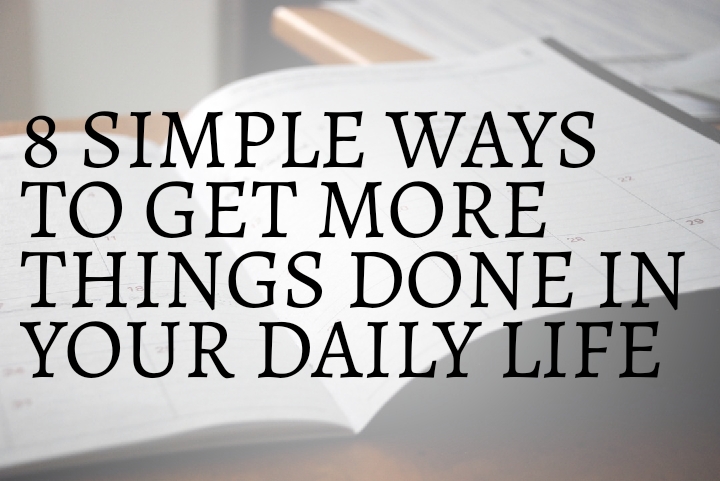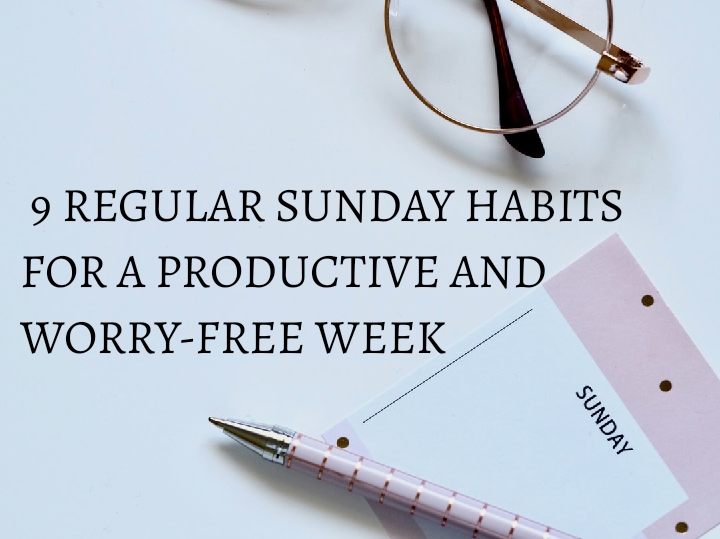In today’s post, I am going to share 8 ways in which you can get more done in your day. Without exhausting yourself, may I add!
Let’s face it. Adulting comes with a whole lot of responsibilities, deadlines, commitments, and things to do.
Often, we tend to find ourselves with a whole lot of to-do list left at the end of the day. I can’t be the only one who sometimes wonders where the day has gone!
If this sounds like you too, then you’re going to love these hacks! Since incorporating them into my (almost) daily routine, I’ve been able to get more done in a shorter amount of time.
So, let’s dive in, 8 simple ways to get more things done in your day.
1. Wake up earlier
This one is a no-brainer, but when you wake up earlier than you usually do, you have a lot more time to be productive. You don’t have to wake up hours earlier, either. Anywhere between half an hour to an hour earlier than usual will do. Waking up early is one of those things that many people hate the idea of, but our bodies are capable of getting used to waking up earlier with time.
Wake up earlier than you do each day and you’d be amazed at how much you have been able to do before 9AM.
Which leads us right into the second hack.
2. Have a to-do list
One of my favorite things to do to stay productive is having a to-do list. To-do lists help me stay on track and help me remember important deadlines or things I should do.
I also find that they help with keeping me accountable, and I get more done in my day than when I don’t jot down everything I need to do.
A simple hack to creating a to-do list is write down all you need to do the next day the night before and tick them off as you get them done.
Easy, Peasy.
3. Make use of your driving/waiting time
Many of us spend long periods of time driving to and from places. To use that time efficiently, we can work on personal development instead of constantly listening to music.
I personally like listening to podcasts or audiobooks. I find that they help me pass the time in a productive manner. Rather than sit still in traffic or waiting for somebody, put in that time to listen to an uplifting podcast or read a book, or do something really beneficial to your mind, body and soul as much as the waiting environment permits.
4. Prepare your outfits ahead of time
This one is a personal favorite of mine. I can’t even begin to tell you how many times I rushed in the mornings because I “didn’t have anything to wear”. It is even worse if you hate to dress up because the burden of having to find the best outfit to wear cripples you.
Now, once week or whenever I have some free time, I pick out outfits to wear for the entire week. This saves so much time in the mornings when I’m getting ready to go out.
I also do the same for special occasions. Having something nice to wear ready and ironed saves me a ton of time that I could put towards doing something more productive.
5. Work in 30-minute windows
Another favorite of mine, with good reason! Whenever I have a lot to do during the day, I like to work in 30-minute windows. I set an alarm for 30 minutes, and work as fast and best as I can during these 30 minutes. Sometimes I give myself a 10-minute break after the 30 minutes are up, but most of the time I find that I can keep that momentum and work for a longer period of time.
Breaking your work helps your mind stay productive, give your eyes some breather especially if you work with a computer. And you also get the opportunity to stretch your back and your legs.
It’s a win-win.
6. Ten-minute cleaning zones
Cleaning is one of those things that many of us don’t enjoy doing, but can’t really get out of doing.
Well, I found a hack which I personally really like and find very effective! Basically, what you do is you set your timer for 10 minutes, and clean as much as you can in these 10 minutes. You’d be surprised at how much you can get done in just that short amount of time!
7. Cook more food than you will eat
This is a little bit of a meal-prep tip. Instead of cooking dinner for just one night, double the recipe and cook for the next night as well.
That way, you’re spending the same amount of time on two portions as you would on just one portion of food!
Cooking in large quantities not only save cooking time, but is also a way to cut down financial cost of cooking.
8. Don’t do it all by yourself. Delegate as much as you can.
There’s nothing wrong with asking for help whenever you need it.
If you are able to give certain tasks to other people, do it. This can be in the form of somebody watching your kids while you get some work done, using a delivery service for your groceries instead of going to the supermarket yourself, or even hiring an assistant to help you with whatever you need done.
Having others help you will not only help you get more done, but it will also help you rest and not worry about everything all by yourself.
BONUS POINT : Use the one-minute rule
The one-minute rule has changed my life. If you have no idea what it is, it’s very simple.
Any tasks that require one minute or less to complete, you do without any hesitation.
Some examples include: making your bed, putting dirty dishes in the dishwasher, and picking something up after it has fallen on the floor.
If you can do it in one minute, don’t delay. Just do it.
I hope these simple hacks work for you and improves your productivity as much as it has improved mine.




